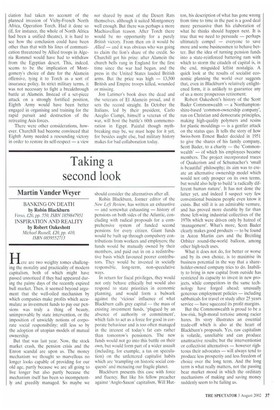When the church bells rang
Allan Mallinson
ALAMEIN by Jon Latimer
Murray, £25, pp. 400, ISBN 0719562031
This year is the 60th anniversary of the battle of Alamein. The name may not quite have the resonance of Trafalgar or Waterloo, but at El Alamein we beat the Germans in a stand-up fight, saving Egypt, the Suez Canal and the Middle East's oil. And it was Rommel we beat too. Thus is the battle in the pantheon of great victories, for as Churchill wrote, 'Before Alamein we never had a victory. After Alamein we never had a defeat.'
This reading of history is, however, flawed. So much about the battle is carefully crafted myth. Despite Correlli Barnett's seminal The Desert Generals, published over 40 years ago, and others which have followed in like vein, the image persists of, before Alamein, a beaten, demoralised British Eighth Army being galvanised by the arrival of Lieutenant-General Bernard Law Montgomery, the battle itself then going strictly according to Monty's Master Plan, with the Desert Rats at last under command of an incomparable general.
What is true without doubt is that the second battle of Alamein, in October 1942, was one of the hardest — if not the hardest — set-piece battles fought on the Allied side, and that afterwards the Montgomery star was firmly in the ascendant, eventually eclipsing that of every other British general. But was Alamein the turning point that Churchill described? Did Montgomery find a whipped army, shake it up and then, with unique mastery of operational art, turn the tables on Rommel, the unbeatable Desert Fox? Was the battle even necessary from a strictly military point of view?
Jon Latimer perhaps wisely leaves the first and last questions essentially unexplored. Barnett and others have already had their say. What we have instead is an outstanding study of the battle itself, carefully situated and explained, clearly and dramatically described, superbly illustrated and mapped, and showing a real understanding of sometimes arcane factors like logistics and the elements of unit morale. Latimer does so too with the advantage of what we now know of Ultra (the special signal intelligence source — the Enigma machine decrypts) and the diaries of the then CIGS, Field-Marshal Sir Alan Brooke. Alamein is an intricate portrait of Eighth Army before and during the battle; we are even told what tunes the pipers in the Highland regiments played as they advanced.
Above all, he lays into the myths, one of the most enduring of which is the cowardly ineffectiveness of the Italians:
For too long there has been a fatuous contempt for Italian arms in Anglophone countries, largely as a result of wartime propaganda. The truth is that Italian soldiers were tough and hardy, and on innumerable occasions they fought as bravely as any soldiers in the world. But the Italian record in adapting operational concepts to technology was almost uniformly disastrous. In both the Army and Navy, doctrine inhibited the adoption of new technology; hut in the Air Force the absence of doctrine had the same effect. All three services suffered from intellectual rigidity and lack of interest in developments elsewhere, and combat came as a profound shock.
In any case, to sniff at Italian fighting spirit demeans the British achievement at Alamein, where half the Axis casualties were Italian. Rommel himself had no doubts. He could easily have blamed his reverses on an unreliable ally, but of the Ariete division, for example, he wrote, 'We always asked them to do more than they possibly could; and they always did.'
Indeed, Latimer shows (as others have before, but to little avail) that it was strong Italian resistance that wrecked Montgomery's original plan, forcing him to regroup and issue new orders after 48 hours, turning the battle into a grinding 12-day slogging match. In so doing, the Ariete, Littorio, Brescia and Folgore divisions simply wrote themselves off.
But the big question remains: was it necessary to fight the battle at all? After General Sir Claude Auchirileck's July battles at and around El Alamein (Auchinleck was C-in-C Middle East but had taken personal command of Eighth Army), the Axis forces were in no position to advance further east. That much is clear from Ultra alone. At the end of July, Major-General DormanSmith, deputy chief of staff at Auchinleck's headquarters in Cairo, wrote an appreciation of the situation for 'the defence of Egypt by the defeat of the enemy forces in the Western Desert'. It envisaged a series of defensive battles 'combined with offensive gestures from time to time', hut 'eventually we will have to renew the offensive and this will probably mean a break through the enemy positions at El Alamein'.
Dorman-Smith, along with Auchinleck, was sacked by Churchill a fortnight later, after which Montgomery appeared as Eighth Army commander (though not the PM's first choice). Montgomery to all intents and purposes accepted DormanSmith's conclusions as the basis of his own concept of operations. However, the appre ciation had taken no account of the planned invasion of Vichy-French North Africa, Operation Torch. Had it done so (if, for instance, the whole of North Africa had been a unified theatre), it is hard to see how the conclusion could have been other than that with his lines of communication threatened by Allied troops in Algeria Rommel would have had to withdraw from the Egyptian desert. This, indeed, seems to be the implication of Montgomery's choice of date for the Alamein offensive, tying it to Torch as a sort of insurance policy. In strict military terms, it was not necessary to fight a breakthrough battle at Alamein. Instead of a set-piece attack on a strongly fortified position, Eighth Army would have been better engaged in organising and training for the rapid pursuit and destruction of the retreating Axis forces.
There were other considerations, however. Churchill had become convinced that Eighth Army needed a resounding victory in order to restore its self-respect — a view not shared by most of the Desert Rats themselves, although it suited Montgomery well enough. But there was perhaps a more Machiavellian reason. After Torch there would be no opportunity for a purely British victory. From then on it would be Allied — and it was obvious who was going to claim the lion's share of the credit. So Churchill got his prize: after Alamein the church bells rang in England for the first time since the war had begun, and the press in the United States lauded British arms. But the price was high — 13,500 British and Empire troops killed, wounded or missing.
Jon Latimer's book does the dead and the veterans of El Alamein proud, and it sets the record straight. In October the Italians, led by their president, Carlo Azeglio Ciampi, himself a veteran of the war, will host the battle's 60th commemoration in Egypt. Painful though mythbreaking may be, we must hope for it yet, for besides aught else, bad military history makes for bad collaboration today.



























































 Previous page
Previous page